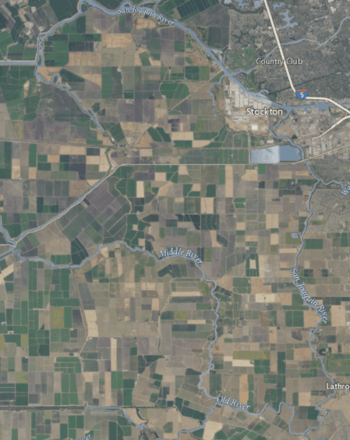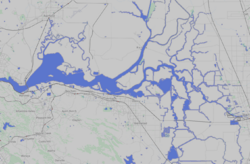Roberts Island facts for kids
 |
|
| Geography | |
|---|---|
| Location | Northern California |
| Coordinates | 37°54′18″N 121°23′07″W / 37.9049250°N 121.3852250°W |
| Adjacent bodies of water | Sacramento–San Joaquin River Delta |
| Administration | |
| State | |
| County | San Joaquin |
Roberts Island is a small piece of land surrounded by water, located in the Sacramento–San Joaquin River Delta in California. This delta is a huge area where the Sacramento and San Joaquin Rivers meet before flowing into San Francisco Bay. Roberts Island is part of San Joaquin County. Its exact location is 37°54′18″N 121°23′07″W / 37.9049250°N 121.3852250°W.
Contents
What is Roberts Island?
Roberts Island is not a natural island formed by volcanoes or ocean currents. Instead, it's a "delta island." This means it was created by people building levees (special walls) around areas of land in the delta. These levees protect the land from flooding, allowing it to be used for farming.
How the Island is Managed
Because it's a delta island, Roberts Island needs special care to stay protected from water. It is managed by groups called Reclamation Districts. These districts are like local government groups that help manage water. They build and maintain the levees and drainage systems. Roberts Island is divided into three parts, each managed by a different district:
- Reclamation District 544 (Upper Roberts Island)
- Reclamation District 524 (Middle Roberts Island)
- Reclamation District 684 (Lower Roberts Island)
These districts work to keep the island safe and dry, especially since much of the land in the delta is actually below sea level.
Life on Roberts Island
Roberts Island is mostly used for agriculture. This means farmers grow crops there. The rich soil in the delta is great for farming. You might see fields of corn, alfalfa, or other crops growing on the island.
Why the Delta is Important
The Sacramento–San Joaquin River Delta, where Roberts Island is located, is very important for California. It provides drinking water for millions of people and water for farms across the state. It's also home to many different kinds of plants and animals, making it an important natural habitat.




